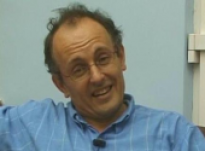Tom - Interview 06

More about me...
Tom was traveling in Australia when he noticed that he was having difficulty with handwriting and also that he had developed a slight tremor in his right hand.
On his return to England, he saw his GP who thought it might be a trapped nerve but referred him to the neurologist anyway. The neurologist gave him some medication and asked him to tell him if his symptoms eased, which they did. Tom was referred to another neurologist who diagnosed Parkinson’s Disease. He was very shocked. Being only 27 years old at the time, it was not something he associated with young people. He started taking Levodopa.
He felt angry and sad for a while. He didn’t tell most people about his diagnosis for six months because his symptoms were well controlled with medication. He was worried that his friends might treat him differently. But they didn’t, they treated him as they had always done.
After five years, he decided to leave his job and get involved in finding a cure for Parkinson’s disease. He set up the Cure Parkinson’s Trust. Over the years he has done many fundraising activities, including walking from John O’Groats to Land’s End and also a 4,5000 mile walk around the coastline of Britain.
Tom now experiences ‘on’ and ‘off’ periods throughout the day. When he is ‘on’, he may experience dyskinesia and when he is ‘off’ he has too little movement, episodes of freezing and a tremor in his hand. The levodopa he takes affects the dyskinesia, but he would rather have dyskinesia than take medication that influences how he feels mentally.
He is able to regulate his symptoms to some extent by adjusting the timing and dosage of his medication and by avoiding protein intake before and immediately after taking levodopa.
Tom believes that the substantial research taking place at the moment will lead to an improvement in the treatment of Parkinson’s disease, which gives him huge hope for the future.
Tom realised it was more important to overcome the mental reaction to having Parkinson's than to worry about what symptoms might eventually arise.
Tom realised it was more important to overcome the mental reaction to having Parkinson's than to worry about what symptoms might eventually arise.
Tom goes through many states with each dose of levodopa. Moments later he realised he had forgotten to take the medication which would prevent dyskinesia.
Tom goes through many states with each dose of levodopa. Moments later he realised he had forgotten to take the medication which would prevent dyskinesia.
Tom's 'offs' are both dramatic and scary to anyone observing them though he knows he always comes out OK at the end.
Tom's 'offs' are both dramatic and scary to anyone observing them though he knows he always comes out OK at the end.
Tom had forgotten to take his amantadine and was able to demonstrate its immediate effect on his dyskinesia.
Tom had forgotten to take his amantadine and was able to demonstrate its immediate effect on his dyskinesia.
Tom describes why he feels it is appropriate to self-medicate and why he doesn't take any pills at night.
Tom describes why he feels it is appropriate to self-medicate and why he doesn't take any pills at night.
Tom feels that a multidisciplinary team is essential to the proper management of a condition like Parkinson's.
Tom feels that a multidisciplinary team is essential to the proper management of a condition like Parkinson's.
Tom explains what he feels is wrong with being pitied.
Tom explains what he feels is wrong with being pitied.
Tom explains the difference for him between getting stuck in doorways and going up stairs or catching a ball.
Tom explains the difference for him between getting stuck in doorways and going up stairs or catching a ball.
Short section on film of Tom playing with a golf club and then with a football.
Short section on film of Tom playing with a golf club and then with a football.
Tom playing with a golf club and then with a football.


